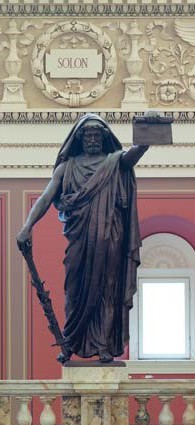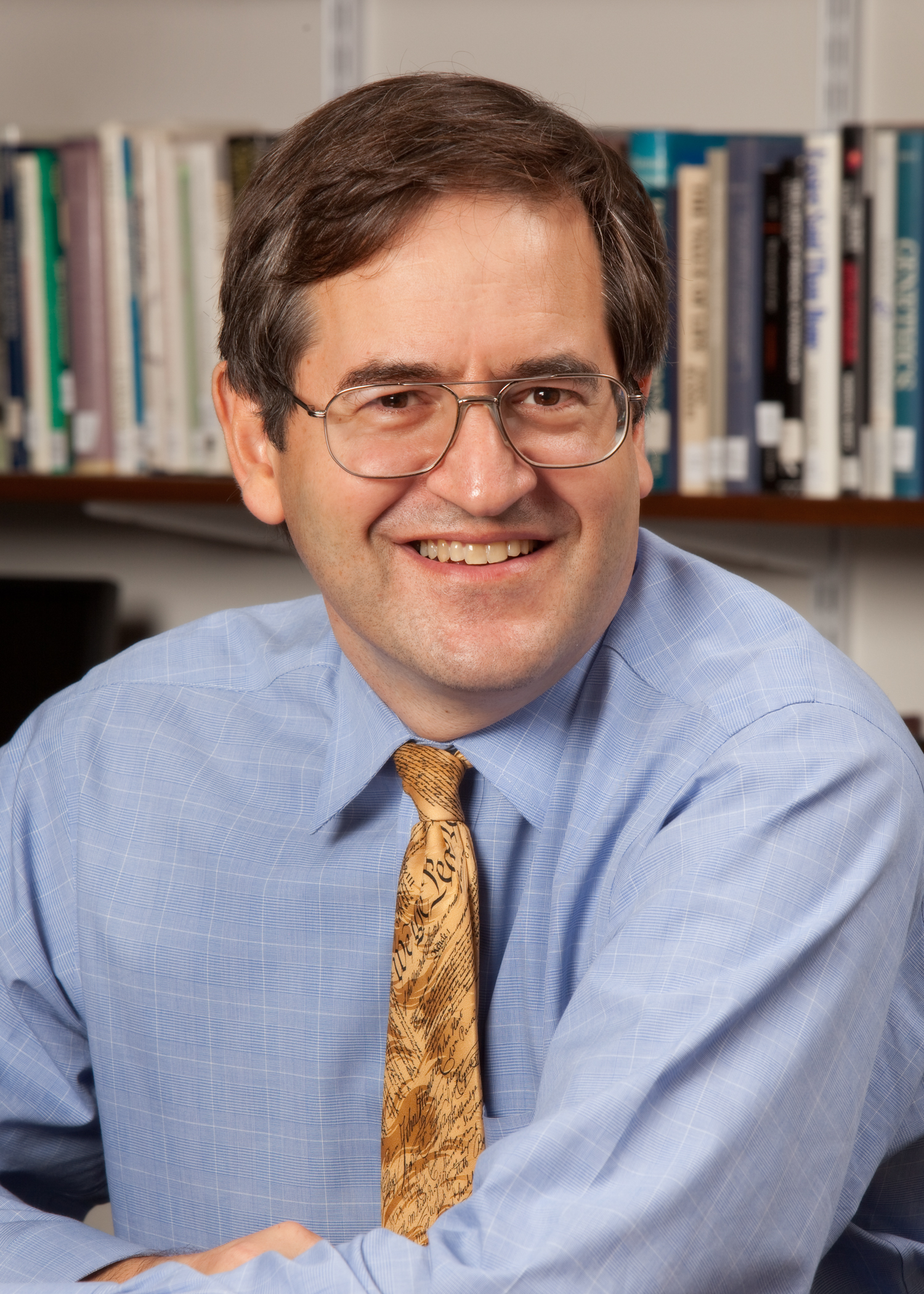
Statue of Solon representing “Law” in the Library of Congress Jefferson Building, Washington, DC. Other statues represent Religion, History, Art, Philosophy, and Science. Solon ruled Athens in the 6th Century BC and is often credited as the founder of Greek democracy.
Mission
To develop and advocate reforms where elected officials have an institutionalized conflict of interest with the American public.
Primary Project
As of 2013, iSolon.org’s primary project has been providing state-by-state information clearinghouses regarding upcoming periodic state constitutional convention referendums. iSolon also maintains a central information clearinghouse for the fourteen U.S. states with such periodic referendums.
Overview
Founded in 2007, iSolon seeks to bring paradigm-changing ideas on the policy implications of new information technologies to the fore of public discussion. New information technologies are creating great opportunities for democratic reform that are not being exploited because elected officials have a conflict of interest in using those technologies to make themselves more democratically accountable.
iSolon explores how that conflict plays out in the design of democratic institutions and analyzes mechanisms, including the use of state constitutional conventions, to address conflict of interest problems. In recent years, iSolon has shifted from a focus on legislative transparency and redistricting to state constitutional conventions.
iSolon sees as one of its distinctive advantages in comparison with other public policy institutions that it can take a long term perspective. As Stanford University Professor Rob Reich has written about the potential advantages of such a perspective: “The institutional design of foundations allows them to operate on a different time horizon than the marketplace and the government…. They can use their resources to identify and address potential social problems decades away or innovations the success of which might be apparent only over a longer time horizon. In short, unlike the marketplace and the state, foundations can “go long.” iSolon pegs its reform agenda to current events, but its focus on fixing the constitutional mechanisms for reforming the constitutional foundations of our democracy is also “foundational” in the Reichian sense of the term.
iSolon is a non-profit, non-partisan, tax-exempt organization under Section 501(c)(3) of the Internal Revenue Code.
State Constitutional Convention Project
iSolon.org is a non-profit committed to exploring and advancing opportunities for democratic reform where elected officials have a conflict of interest with the American public and auxiliary democratic institutions are needed to address the conflict. Its current area of focus is state constitutional convention based democratic reform. Fourteen U.S. states have a periodic referendum on whether to convene a state constitutional convention. The last one was New York in 2017; the next is Hawaii in 2018. In most of these states, the referendum appears on the ballot only once every twenty years. In most of these states, too, a state constitutional convention offers the only opportunity to bypass the legislature’s gatekeeping power over constitutional amendment. iSolon.org’s previous area of focus was the use of information technology to enhance democratic accountability.
For a review of the literature, history, and democratic function of the periodic state constitutional convention referendum, see J. H. Snider, Does the World Really Belong to the Living? The Decline of the Constitutional Convention in New York and Other US States, 1776–2015, Journal of American Political Thought 6, no. 2 (Spring 2017): 256-293. For a symposium on state constitutional convention referendums, see Snider, J.H., et al., The Politics of State Constitutional Reform, American Political Science Association Law & Courts Section, Fall 2016.
 iSolon.org is a project of J.H. Snider, who founded it in 2007. In the interim, Snider has been a fellow at Harvard University’s Edmond J. Safra Center for Ethics (2011-13) and the Harvard Kennedy School of Government’s Shorenstein Center on Media, Politics and Public Policy (2008). He came to Washington, DC as an American Political Science Association Congressional Fellow in Communications & Public Policy (1999-2000). He then served as a fellow and research director at New America (2001-2007). From 1994-1999 he served as a teaching assistant and fellow in Northwestern University’s Department of Political Science. He has a Ph.D. in American Government from Northwestern University, an M.B.A. from the Harvard Business School (with a focus on non-profit management), and an undergraduate degree in Social Studies from Harvard College.
iSolon.org is a project of J.H. Snider, who founded it in 2007. In the interim, Snider has been a fellow at Harvard University’s Edmond J. Safra Center for Ethics (2011-13) and the Harvard Kennedy School of Government’s Shorenstein Center on Media, Politics and Public Policy (2008). He came to Washington, DC as an American Political Science Association Congressional Fellow in Communications & Public Policy (1999-2000). He then served as a fellow and research director at New America (2001-2007). From 1994-1999 he served as a teaching assistant and fellow in Northwestern University’s Department of Political Science. He has a Ph.D. in American Government from Northwestern University, an M.B.A. from the Harvard Business School (with a focus on non-profit management), and an undergraduate degree in Social Studies from Harvard College.
Snider edits The State Constitutional Convention Clearinghouse and state-specific clearinghouses for states with upcoming periodic referendums, including The Iowa State Constitutional Convention Clearinghouse (2020), The Hawaiʻi State Constitutional Convention Clearinghouse (2018), The New York State Constitutional Convention Clearinghouse (2017) and Rhode Island Constitutional Convention Clearinghouse (2014). The state-specific clearinghouses the most detailed record of published pro & con arguments ever compiled in one place and published online. Nest up are Alaska (2022), Missouri (2022), and New Hampshire (2022). Snider has published more than fifty op-eds on state constitutional convention referendums (see “The State Con-Con Papers,” Nov.8, 2021, for a compilation).
Staff & Board
J.H. Snider
President and Board Member
Solon Snider
Board Member
Terra Snider
Board Member
Board Emeritus
Micah Altman
Director of Research, Program on Information Science for the MIT Libraries, Massachusetts Institute of Technology
David Farrell
Professor of Politics, University College Dublin
Oliver Hall
Director, Center for Competitive Democracy
Robert Martineau
Professor of Law, Emeritus, University of Cincinnati
Carol Beach
Former Speech Writer, First Lady Hillary Clinton
Gerald Benjamin
Professor of Political Science, State University of New York (SUNY)
Christopher Bopst
Partner, Goldberg Segalla LLP
Peter J. Galie
Professor of Political Science, Emeritus, Canisius College
Paul Hyland
Chief Technology Officer, Editorial Projects in Education
Sheila Krumholz, Secretary of the Board
Executive Director, Center for Responsive Politics
Christopher Sands
Senior Fellow, Hudson Institute
Chris Spence
Director of Technology Strategy and Programs, National Democratic Institute
